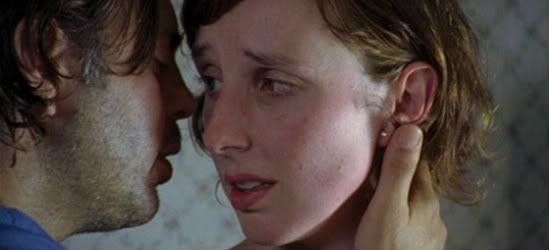
Few people will disparage an expectant mother. People are people, good and bad, but there’s something majestic, alluring, and graceful about a pregnant female. It’s some inexplicable aura that surrounds them, a soft soothing light that alters the mood of anyone they come in contact with. A meaningful moment with one is akin to a divine experience. It’s this logic that permeates David Barker‘s “Daylight.”
Daniel (Aidan Redmond) and the expecting Irene (Alexandra Meierhans) share a tender, expository moment in their bedroom as the morning light nudges them conscious. With plans to participate in a family member’s wedding, Daniel dreads a run-in with Irene’s father due to an uncomfortable money/business situation. The angelic spouse assures him everything will be fine, but he can’t be convinced and soon enough they are off on the road with the subject lingering awkwardly in the air between them. Barker lays heavy on the foreshadowing in unfortunately obvious ways (Irene asks her husband what would happen if this was their last day together), soaking the subtler opportunities (quiet moments in the car that could potentially initiate an unsettling tone) in either music or voiceover recitations of Catholic prayers by our female protagonist.

Either way, we know something bad is going to happen, and once the couple picks up hitchhiker Renny (Michael Godere), things take a turn for the worse. Amongst questions about their day and inquiries about the car they’re in, the chatty Renny encourages Daniel to pick up his friend a bit up the road. This scene, amongst a few other ones, gives a slight whiff of Michael Haneke a la “Funny Games,” with an unsettling (and mysterious) tug-of-war being played out much like when the two murderers first show up to the family’s vacation house. Barker plays his cards well here, using his confined location to its maximum potential and stretching the tension until it snaps, erupting in violence (something he doesn’t return to until the end, for better or worse, but more on that later). Renny and new arrival Leo (Ivan Martin) take the couple to a house, meet up with the final member of the trio Murph (Brian Bickerstaff) and together orchestrate a scheme to pump money from Irene’s family. The couple is separated; Murph takes Daniel to a hotel and awaits the ransom while Renny and Leo stay in the house with Irene.
Aside from a brief, almost random snippet of the hotel room, the rest of the movie remains at the house and involves Irene, Leo, and Renny playing off each other in various kidnapper/kidnappee scenes. It’s stuff we’ve seen before (the abductee hides a weapon, tries to escape, tries to convince one of them to let her go, etc.) but the cold, quiet Haneke tone that the director plays with is initially promising. However, taking this as a brooding, tense thriller ultimately doesn’t work. There’s no sense of dread or discomfort, and even the cinematography refrains from being too cold or ominous, instead focusing on suburban-green grass and endless skies. The filmmaker may play it like a drama that happens to have some of the Austrian filmmaker’s directing cues and plot — but what Barker really wants to present is how differently these men act in the presence of Irene, a sensitive, ethereal woman who the men seem to be fascinated by. While she is the one that is held captive, many of the scenes involve her softly coming out on top, be it a tender moment with Renny as he listens to the baby inside her or an intimate conversation with Leo. Even their scummy, chauvinistic advances towards her are delicately rebuffed, further suggesting her unspoken power over the thugs.
Meierhans, actually pregnant during filming, will get much of the positive notice here for obvious reasons. And she is quite good, embodying Irene in a reserved performance that a lesser actress would likely ham up with histrionics. Special mention should also go to Godere and Martin, who are both able to believably mix vulnerability into their antagonistic characters without it ever feeling like a hack writer’s too-obvious attempt at rounding a criminal’s persona (give him mommy issues!). Had either of these three been at all over-the-top, much of the film would’ve been overcooked.
Due to the single-setting location, perspective shifts break up the narrative and give us more insight into Irene, showing her with a therapist and professing interest in the Bible. It’s theoretically an understandable choice to provide more moments with the main character to really get in her head, but it’s all traits that we either already know about or can gather from her performance. By constantly pulling away to less interesting avenues, we’re forced to reinvest and rebuild every time the story picks up again at the house. This on-and-off attitude is a huge pitfall for the film, especially during one of the plot-vacations where we again see the first scene of Daniel and Irene in bed. Not only does it feel too spoon-fed, but it also chips away at the audience’s connection.
With a startling conclusion that destroys all of the comfort established beforehand, the final act does stick for a while after the credits have finished. Even so, it’s hard to shake the film’s overall unevenness: for every right road that the movie turns down, it goes down another which takes too much time away from the elements that work well. It almost seems like Barker didn’t know that his actors were as good as they were, that they exemplified what he was trying to say without even having to outwardly say it. Why talk about religion so explicitly when your lead actress expresses what you’re saying in her performance alone? That sort of elegance and nuance would’ve really allowed the film to flourish. That said, the filmmaker does manage to successfully carve a convincing story and include some personal, weighty substance within. It’s rare that you’ll find both of these sides nowadays so well intertwined, with neither suffering in favor of the other. Even some of the biggest names in the industry can’t do this, so while “Daylight” isn’t perfect, it still manages to outdistance some of the more seasoned vets. [B]
